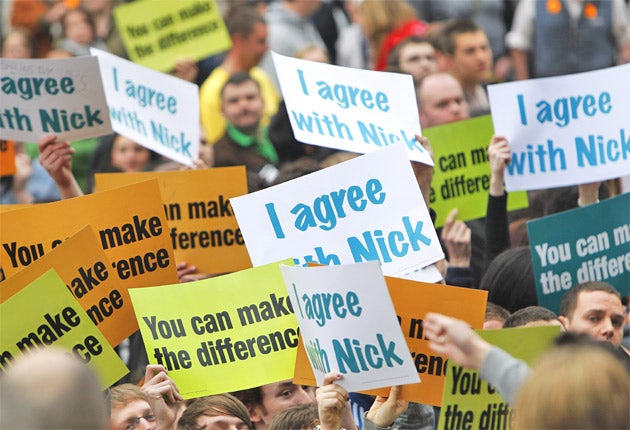Five things we learnt about the Lib Dems this week
Oliver Wright reflects on developments in the party after over a year in government

1. The Lib Dem euro dream is over
Always the most pro-European party in Britain, senior Liberal Democrat ministers are now questioning for the first time whether there is the political will on the Continent to resolve the crisis in the eurozone. Nick Clegg himself has admitted that Britain will not join the euro in his political lifetime while his colleagues go further.
One said he was deeply depressed by the lack of political willpower in France and Germany to take the economic decisions necessary to reassure the markets. Another said the European dream was in "unchartered waters". This is significant. The Liberal Democrats in Government will always act as a pro-European counterbalance to the Tories – but there is a new sense of realism in the air.
2. Morale is surprisingly high
For the last three conferences, aides to Nick Clegg have chided journalists for confidently predicting rebellions and discontent which have not, in the end, materialised.
But unlike in Liverpool last year and Sheffield in the spring, at this conference the party really does seem to have come to terms with Government.
One very senior Liberal Democrat MP said he had been genuinely surprised by upbeat tone in Birmingham this week – from activists and councillors – which he did not expect.
Not only were party members not haunted by the poll ratings and the loss of the AV referendum but they had developed a new sense of identity as the social conscience of the Government.
Unlike last year they believe that the party has achieved tangible results (changes to the NHS reforms, tough measures on global warming and vetoing cutting taxes for the rich) – and they are much more comfortable with the new "business-like" relationship between Coalition ministers.
3. A new generation of leaders is yapping at the heels of Clegg and co
The star of the show this year has undoubtedly been the party's new, youngish, president Tim Farron. He has astutely positioned himself as the grassroots champion – provocatively bashing the Tories in his conference speech – while at the same time remaining, superficially at least, loyal to the leadership.
If the Liberal Democrats go back into opposition at the next general election he is ideally placed to challenge Nick Clegg for the leadership (assuming Mr Clegg tries to stay on). Mr Farron is positioning himself well to the left of Mr Clegg and the job of president means he spend lots of time travelling the country getting to know activists on the "rubber-chicken" circuit.
Other Liberal Democrats who have fared well this week include Steve Webb, the Pensions minister, and Ed Davey, the Consumer Affairs minister. Both could challenge Mr Farron for the leadership but would have the disadvantage of being too closely associated with the Government.
4. Party management has got smart
Depending on your viewpoint, the Liberal Democrats have either been the most maverick party in Britain or the most democratic. A few weeks ago the party was briefing that conference would be voting on plans to legalise drugs – not because they supported the policy but because they knew they couldn't control it. But, in the event, this has been the best-managed conference of recent years.
The leadership succeeded in preventing a vote on the NHS reforms (which they would almost certainly have lost) and there have been few embarrassing stories emerging from the conference floor or fringe meetings. Whether this is a trend or a blip, however, remains to be seen.
5. Things are not going to get easier
Conferences are a bubble and it's easy to forget there is a real world out there. This year the economic woes of the country have been hard to ignore. No one here now really believes that when the Liberal Democrats meet again in 2013 the economy will be on the mend and the party will be thinking about a manifesto of new spending commitments or "sharing the proceeds of growth".
But don't expect the Coalition to fall apart or for there to be significant defections to Labour.
This week has proved the party is in it for the long term – not necessarily because they like it but because there is no other choice.
Subscribe to Independent Premium to bookmark this article
Want to bookmark your favourite articles and stories to read or reference later? Start your Independent Premium subscription today.

Join our commenting forum
Join thought-provoking conversations, follow other Independent readers and see their replies